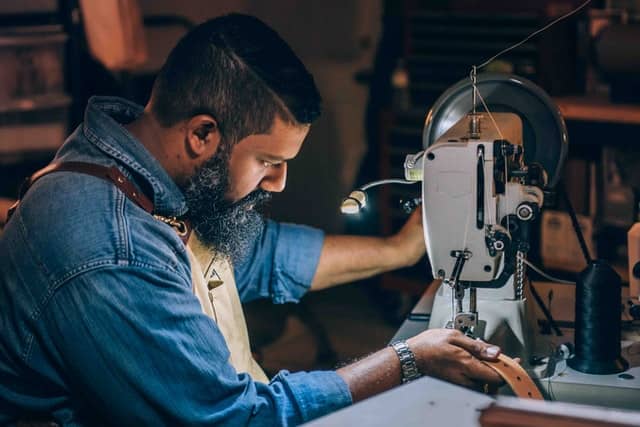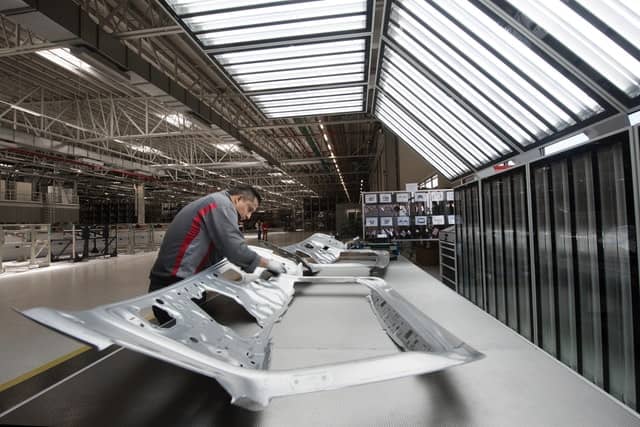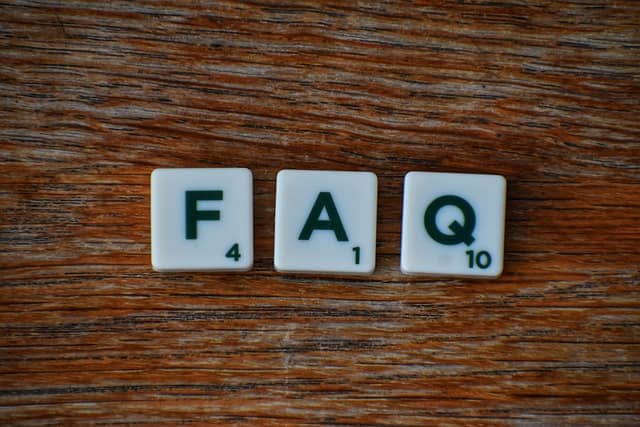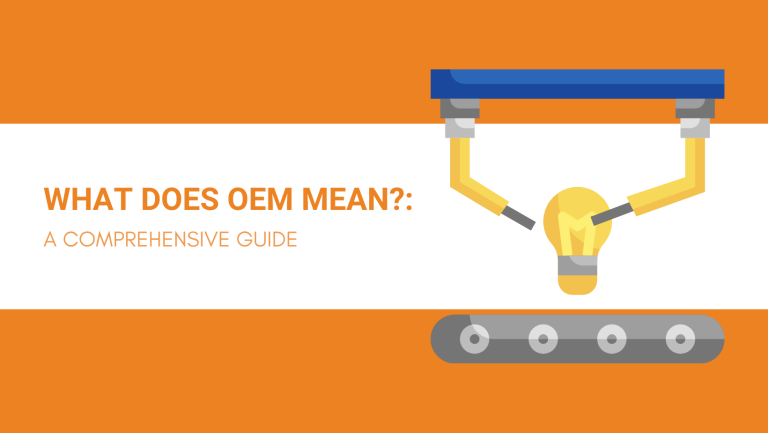OEM stands for Original Equipment Manufacturer. It is a common term in the world of manufacturing that you are likely to come across as you source products from China or anywhere else in the world.
Naturally, such technical terms can be intimidating and the root of many confusing questions: What does OEM mean? Is it different from typical product sourcing? How would it benefit your business?
Read on as we explore the concept of OEM in depth and offer some insights on how to navigate it.

OEM Definition
An Original Equipment Manufacturer (OEM) is a manufacturer that produces goods and sells them to other companies that sell them under their brand names.
The products that they sell are referred to as OEM products. They are usually made in a custom design that is unique to the company that orders them.
However, the OEM concept can be applied a bit differently across some industries. Let us discuss them in more detail.
What Does OEM Mean in Manufacturing?

In a nutshell, OEM in manufacturing is about a brand outsourcing the production of an entire product to a factory that specializes in the same. The brand can then focus on marketing, product development, and other front-end business commitments.
Take, for example, that you run a toy store and would like to start selling custom toys. Your OEM process would unfold as follows.
- First, come up with a custom toy design that is unique to your brand
- Find a toy manufacturer that offers OEM services
- Share the design with them for them to evaluate, prototype and, advise on manufacturability
If the design is viable, you can request a sample toy to verify the quality of the manufacturer’s work. You can then negotiate and agree on terms before placing your first order.
The toys would be manufactured based on your specifications and, in most cases, the manufacturer may also label them with your brand name upon request.
OEM in the Tech and Automotive Industry

Components are parts of a product that are put together to make a complete product unit. In the tech and automotive industries, they are often referred to as OEM parts and they bring a slightly different angle to the concept of OEM.
For illustration, let us consider PC companies such as Hewlett Packard (HP) or Dell. Each of their computers comprises numerous parts such as electric circuits, cables, memory storage devices, and lots more.
It would be extremely expensive and time-consuming for such firms to manufacture each of these components in-house and then assemble them to make a computer. Instead, such companies take a more efficient OEM approach. It works as follows:
- HP designs its computer model including the specific type of parts that it will require and their technical parameters
- HP finds manufacturers that make the types of components that they need and prefer not to make in-house
- The manufacturer makes the exact type of parts that HP requires and delivers them to the firm for assembly with other parts
As you may have noticed, the general concept is the same; in that, the Original Equipment Manufacturer still delivers custom-made goods to their client.
However, in this case, they only deliver a single part or system and not a finished product that is ready for sale.
Why OEMs?

If a company can design its products and have experts that understand how different components should work, then why do they need an Original Equipment Manufacturer?
Well, there is a lot more that goes into making a product beyond the product development stage hence the need for collaborative partnerships.
Plus, Original Equipment Manufacturers are experts in their fields. They understand the manufacturing of different products in detail and know how such processes can be modified to make the products fit specific applications.
Brands also opt to work with OEM partners because they:
Offer Economies of Scale
Original Equipment Manufacturers tend to work on a large-scale basis because they serve multiple customers. As a result, they enjoy economies of scale and can manufacture products at a lower cost.
Support Cost-Effectiveness

It requires a significant amount of both monetary and human capital to set up a factory and get it running. Most brands may not have the resources for this and even those that do find it cumbersome and taxing.
In contrast, working with an OEM partner offers brands access to a full range of factory services without them having to incur the costs of setting it up or maintaining it.
Create Room for Innovation
Choosing to manufacture every product component in-house can limit a brand’s innovative options. This is because every time you would need to alter or improve your products, you would need to also reconfigure your production lines.
It is time-consuming and can exponentially increase production costs.
Delegating such tasks shifts this burden to your OEM partner. Moreover, most factories are equipped with different machines to suit different production requirements. Their flexible manufacturing systems are easily adjustable to accommodate such changes.
OEM and Packaging

The core goals of Original Equipment Manufacturing are to differentiate your products from those of your competitors or introduce an entirely new product to the market.
However, in doing so, it is important to consider that your customers interact with the packaging of your product long before they try the product itself. This, therefore, makes custom packaging an integral part of OEM. More so when sourcing finished products.
Most Original Equipment Manufacturers offer branded packaging services in-house. You may only have to provide your preferred packaging design and pay extra fees for the packaging services.
On the other hand, if your manufacturer does not provide such services, you can request your sourcing agent to handle the custom packaging aspect for you.
FAQs about OEM

What Are the Benefits of OEM?
Sourcing products wholesale and reselling them can seem a lot easier than original equipment manufacturing. However, OEM offers unique advantages such as:
- Custom product designs can attract customers to your brand because they are different from others in the market.
- OEM allows you to develop products using ingredients and materials that you prefer or can offer customers more product value.
- OEM products carve out a niche for you in the market that is not oversaturated.
- The uniqueness of OEM products may allow you to sell them at a distinct price point from other brands and make better profits.
Is OEM the Same as Original?
Yes.
OEM parts or products are considered originals because they are made by the same manufacturer that supplies the brands that sell the same products.
For example, if you buy auto parts for a Toyota car from the same manufacturers that supply Toyota, those would be considered original parts because the OEM is the same.
However, if you buy them from a different manufacturer, they would not qualify as originals. Aside from the difference in manufacturers, the quality, specs, or materials are not always the same.
What Is the Difference Between OEM and Aftermarket Manufacturers?
An Original Product Manufacturer works directly with brands. It is a business-to-business supplier. Due to this, they also have very detailed briefs on the specific design details and standards of the products that the brand sells.
In comparison, an aftermarket manufacturer is a business-to-customer supplier. They study the designs of product components and manufacture them based on their research. Some use the exact materials and dimensions while others alter them slightly.
OEM products are, therefore, usually of better quality and more authentic than aftermarket ones. They may, however, cost more.
What Is the Difference Between an OEM and VAR?
An Original Equipment Manufacturer makes custom products and sells them to brands. However, in some cases, they may also make some products under their own label and sell them directly to end-users.
VARs are Value Added Resellers. They buy products that OEMs supply to the market, modify them, then sell them at a markup.
An example of this would be print-on-demand services. A VAR would buy plain mugs or polo t-shirts, add value to them by decorating them then sell them at a profit.
How Do I Find an OEM Manufacturer?
You can find OEM manufacturers on your own or by working with a professional sourcing company.
If you would like to do it alone, you can begin by running an online search on Google or e-commerce platforms like Alibaba. Remember to always specify the type of manufacturer you are looking for e.g. ‘OEM sneakers manufacturer’.
You could also follow up your online research with trade show visits as well as factory tours. Both of these options would allow you to interact with manufacturers directly and assess their sample products or production capabilities.
Alternatively, if you would prefer a more assured and seamless process, consider working with a sourcing company. They would go through your list of OEM requirements and find you top manufacturers that can deliver what you need.
A sourcing company may also provide:
- Warehousing services
- Branded packaging
- Product development support
- Quality inspection services
- Order fulfillment
- Shipping coordination services
In Summary
To sum it up, working with an OEM partner allows you to keep developing products and growing your brand without worrying about the complexities of manufacturing. It is equally ideal for start-up brands and well-established ones too.
Does this sound like the kind of solution you have been looking for? Then there is no reason why you can’t get right on it.
We, at NicheSources, as a professional dropshipping and sourcing company, can help you find the right Original Equipment Manufacturer for your project. We would also handle all the product sourcing processes on your behalf right from the design stage to packaging and global shipping.
Simply send us a brief outlining your requirements, request your free quote, and we will get back to you with all the details.

